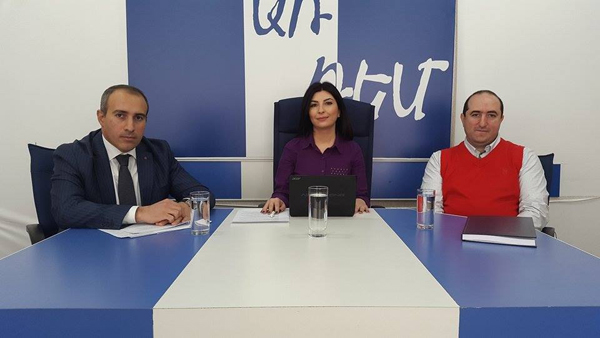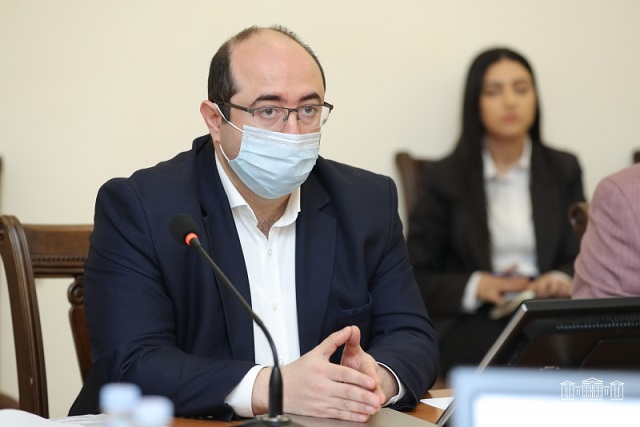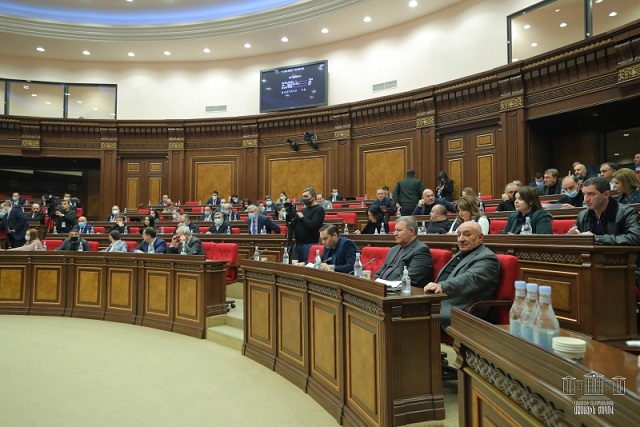Corruption in Armenia’s economy and the economic consequences of corruption The subject of “Aravot” online “Face to Face” program is debated by PhD in Economics, Associate Artak Manukyan and Deputy Minister of Justice of Armenia Suren Krmoyan
Lusine Budaghyan – The international financial institutions providing loans and grants to our country in the years up to fight against corruption, recently, are regularly stating about the high-level corruption in the country. According to them, “monopolies and corruption are walking hand in hand”, “The greatest enemy of Armenia’s reputation is the corruption” and so on. Mr. Krmoyan why the corruption instead of decreasing is increasing, which is proved by the 2015 indicator of perceptions of corruption published by the “Transparency International” anti-corruption organization, according to which out of 167 countries listed Armenia ranked the 95th and in 2014 – the 94th.
Suren Krmoyan – Corruption is a phenomenon that exists in Armenia and in many other countries, including in the developed countries of Western Europe, although the statistics are published newly on what damages it causes to the economy, on how many hundreds of billions of euros of losses it causes to the European Union. As for Armenia, we realize the existence of these phenomena in different sectors of the economy, and for this purpose, we have elaborated and are implementing the strategy to combat corruption and many other events.
If we are speaking in connected with the indicator by the “Transparency International”, then I would like to remind you that the previous three years’ index was improved by one or two scores, in which case our partners were saying that it is not a significant improvement, just mathematical numbers. Followed by the same logic, I can say that the corruption perception index shows that the situation is stable, it has not yet changed, it increased or changes in one score. This, certainly, does not suffice the government and the society, therefore, I think that last year we had started sufficiently active process, including in terms of assessing corruption risks in the business sector, and I think that in the coming years, we will implement such reforms and will have such results that would be visible not only to the government, not only to state officials but also to the public and each citizen will see its positive trends.
L. B. – Mr. Manukyan, you regularly point out the places of the corruption risks to the fighters against corruption, particularly pointing out to the single-source procurements, which according to you, contain huge corruption risks. You have talked about the procurements of the Dilijan Education Center of the Ministry of Finance, when one soap-dish was bought for 61 thousand drams, the metal box for napkins – 40 thousand drams. What are the single-source corruption risks?
Read also
Artak Manukyan – As for the Corruption Perception Index by the “Transparency International”, there is a very important word there: it does not show the level of corruption but the perception of corruption, in other words, if someone is regularly watching H1 TV channel, or actually is a bank which finances the anti-corruption projects, it is clear that this perception is less visible for him than for a larger public. The second key factor which can be stressed upon is that we regularly see the efforts of our government officials and their work-time to request money from the donors to make contributions and fight against corruption while Mr. Krmoyan confirmed that in recent years, we tramp in the same place. In previous years too, if we examine, the snapshot was not so clear, in other words, it was obvious that we have exhausted these resources, which we could use to reduce corruption. But to make a radical and visible improvements, in my opinion, we should have not only an anti-corruption council but in addition to this council we should have a legal enforcement which is associated, as many people talk, with the so-called political will, and we have the evident proof of it. We can consider Georgia, which recorded a radical growth.
To say that this problem exists only in the part of the Ministry of Finance, it would be cut off from the reality. If we study the consequences of the corruption, by and large, the corruption has three affecting directions in terms of economy: one is the public finances, the second is the poverty, people’s life quality and so on, and the third is the attractiveness of business sector and so on. When we are talking about the first component, it is obvious that being non-competitive, but a way accepted by the law, it already obstructs the competition factor and also leads to more deterioration of the business environment as there is no competition. If we look at the RA Law on “Procurements”, then it reads that the preferable form is the open procedure, but when we look at the statistics, we see that about 60 percent of cases, they are single-source procurements rather than competitive procurements, in other words, the law says one thing, the practice – another thing. The problem is not only the law but its enforcement because, from the perspective of the law, we have copied the best law of the European Union.
Lusine BUDAGHYAN,
“Aravot” daily





















































